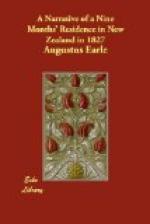It seems unaccountable that the natives of an atmosphere so dry as this is—a country in which there are no marshy bogs, and where, though there is an abundance of water, it is generally seen in clear and sparkling rills rushing down from the mountains into the rivers—should be subject to so fatal a disease as galloping consumption. The only cause to which I can attribute such an affliction is, their indifference to lying out all night exposed to every change of weather—to cold and rain—which, in young and tender constitutions, must produce the most pernicious consequences. If some few are rendered hardy and robust by this process, many, no doubt, are killed by it. I endeavoured to impress on the minds of all my female friends the great danger of thus exposing themselves to cold; but they only laughed at my precautions, and said, “If Atua wished it, so it must be; they could not strive with the Great Spirit.”
I have heard so much said about the great impropriety of the white settlers admitting the native females into their society, so much of the scandalous conduct of captains of ships suffering their men to have sweethearts during their stay in port, and so much urged in justification of the indignation shown by the missionaries when this subject is touched on by them, that I feel it necessary to state one decided benefit which has resulted from that intercourse, and which, in my opinion, far more than counterbalances the evil against which there has been raised so loud an outcry.
Before our intercourse took place with the New Zealanders, a universal and unnatural custom existed amongst them, which was that of destroying most of their female children in infancy, their excuse being that they were quite as much trouble to rear, and consumed just as much food, as a male child, and yet, when grown up, they were not fit to go to war as their boys were. The strength and pride of a chief then consisted in the number of his sons; while the few females who had been suffered to live were invariably looked down upon by all with the utmost contempt. They led a life of misery and degradation. The difference now is most remarkable. The natives, seeing with what admiration strangers beheld their fine young women, and what handsome presents were made to them, by which their families were benefited, feeling also that their influence was so powerful over the white men, have been latterly as anxious to cherish and protect their infant girls as they were formerly cruelly bent on destroying them. Therefore, if one sin has been, to a certain degree, encouraged, a much greater one has been annihilated. Infanticide, the former curse of this country, and the cause of its scanty population, a crime every way calculated to make men bloody-minded and ferocious, and to stifle every benevolent and tender feeling, has totally disappeared wherever an intercourse has taken place between the natives and the crews of European vessels.




